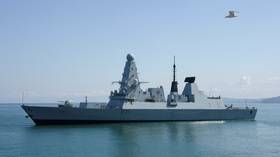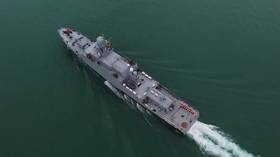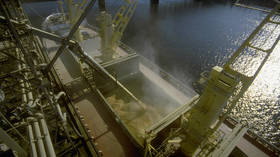Moscow claims it sees ‘true’ plans behind grain coalition

The proposal to put together an international naval coalition to escort ships with Ukrainian grain through the Black Sea is, in reality, one that pursues a completely different goal, Russia’s foreign minister Sergey Lavrov has claimed.
“The attempts to organize some kind of international coalition for the implementation of these procedures are aimed solely at interfering in the Black Sea region under the auspices of the UN. And we see this quite clearly,” Lavrov pointed out, following talks with Iran’s Foreign Minister Hossein Amir-Abdollahian in Tehran on Thursday.
The idea of sending into the Black Sea the warships of the countries allegedly affected by grain shortages caused by the conflict between Russia and Ukraine, was floated by Lithuanian FM Gabrielius Landsbergis during his trip to London in late May. According to the media, the British authorities had voiced support, in principle, for such a mission.
“There’s no problem with exporting grain without putting together any such schemes,” the Russian foreign minister assured his audience.
He reiterated that Moscow guarantees the security of vessels with grain in international waters all the way to the Bosphorus strait, a key access channel controlled by Ankara. “We have understanding on this issue with Turkey,” Lavrov said.
Ukraine is a major exporter of grain but its ships have been unable to put to sea since the launch of the Russian military operation in the country in late February. Kiev and the West are blaming Moscow for blocking their passage, while Russia insists that logistical problems have been created by naval mines placed by Ukraine itself.
“The efforts that are now being undertaken by both Turkey and the UN Secretary General [Antonio Guterres] would’ve been a success a long time ago if Ukraine and its Western masters had solved the problem of demining ports in the Black Sea,” Russia’s top diplomat pointed out.
UK Foreign Secretary Liz Truss on Thursday also addressed the issue of helping Ukrainian grain leave the ports, saying that it would require “an international effort.”
The UK Foreign Secretary, who was speaking after talks with Turkish counterpart Mevlut Cavusoglu, has claimed that a failure to swiftly resolve the grain-transport deadlock “will cause great famine.”
“[Russian President Vladimir] Putin is weaponizing hunger, he’s using food security as a callous tool of war. He’s blocked Ukrainian ports, and is stopping 20 million tonnes of grain being exported across the globe, holding the world to ransom,” Truss said.
Lavrov had previously blamed the West for exaggerating the issues surrounding Ukrainian grain, pointing out that the blocked supplies accounted for “less than 1% of the global production of wheat and other cereals.”
“Therefore, the current situation with Ukrainian grain has nothing to do with the food crisis,” he said, speaking a few weeks ago.














